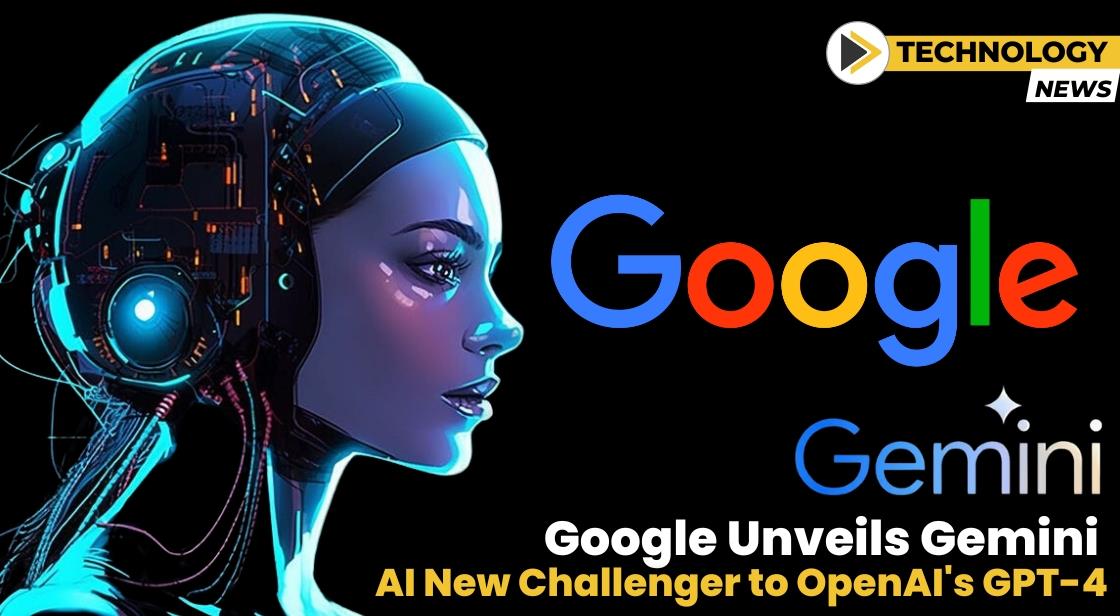Google unveils Gemini: A Multimodal AI Model Poised to Challenge OpenAI's GPT-4

News Synopsis
Google steps into the arena of AI supremacy with Gemini, a formidable rival to OpenAI's GPT-4. Highlighted at the I/O developer conference earlier this year, Gemini emerges as a multifaceted AI model promising groundbreaking advancements in daily human life.
Google's Revolutionary AI Model
Marked as Google's most versatile and robust AI model, Gemini is an innovative multimodal system equipped to comprehend and navigate across diverse data types: text, code, audio, images, and videos. This breakthrough model heralds a pivotal leap in AI's potential to transform daily experiences.
Pichai's Vision for Gemini
Google CEO Sundar Pichai expresses his enthusiasm for Gemini, emphasizing its role as a significant milestone in Google's technological journey. He hails Gemini's debut as a monumental step, poised to unlock unprecedented opportunities for global communities.
Gemini's Versions and Applications
Gemini arrives in three distinct versions tailored for varying requirements. Gemini Nano, a lightweight iteration, caters to offline Android devices. Gemini Pro, a robust model, anchors Google AI services and forms the core of Bard. The most potent, Gemini Ultra, is geared for high-demand data center and business applications.
Gemini's Multimodal Prowess
Google touts Gemini's innate multimodal capabilities, empowering it to master intricate tasks demanding nuanced and diverse comprehension. Its proficiency spans text, images, audio, and beyond, enabling it to elucidate complex concepts in subjects like mathematics and physics.
Gemini Vs. GPT-4
Google positions Gemini against OpenAI's GPT-4, claiming superiority across 30 out of 32 benchmarks, as stated by DeepMind CEO Demis Hassabis, marking a potential paradigm shift in the AI landscape.
Release and Future Roadmap
Google is rolling out Gemini 1.0 across its ecosystem, embedding it in Bard, Pixel 8 Pro, and Search. The Gemini Pro version becomes available to developers and enterprise users through Gemini API in Google AI Studio and Google Cloud Vertex AI starting December 13. Gemini Ultra is undergoing safety assessments and anticipates an early-access release for experimentation in the forthcoming months.
Three Versions, Endless Possibilities:
Gemini comes in three distinct flavors, each catering to diverse needs. Gemini Nano is a lightweight version that runs directly on Android devices without needing an internet connection, ideal for on-the-go tasks.
Gemini Pro serves as the core for Bard and powers many Google AI services, offering enhanced capabilities for demanding tasks. Finally, Gemini Ultra reigns supreme, designed for tackling complex challenges in data centers and business applications.
From Pixel to Data Center: Gemini's Wide Reach
The rollout of Gemini has already begun, with its integration into various Google products like Bard, Pixel 8 Pro, and Search. Developers and enterprise customers can access Gemini Pro starting December 13th, while Gemini Ultra undergoes further testing and will be available for early experimentation soon.
The Future of AI: A Gemini-Led Era
With its groundbreaking capabilities and diverse applications, Gemini is poised to shape the future of AI. Its ability to understand and interact with the world around us in a natural and comprehensive way paves the way for revolutionary advancements in various fields. From personalized education to groundbreaking research, Gemini's potential is limitless.
Conclusion:
Google's Gemini marks a significant milestone in the evolution of AI technology. Its multimodal capabilities and impressive performance raise the bar for future models and promise to transform the way we interact with the digital world.
While the AI wars are far from over, Gemini's arrival undoubtedly shifts the balance of power and ignites anticipation for what the future holds in the realm of intelligent machines.
You May Like









